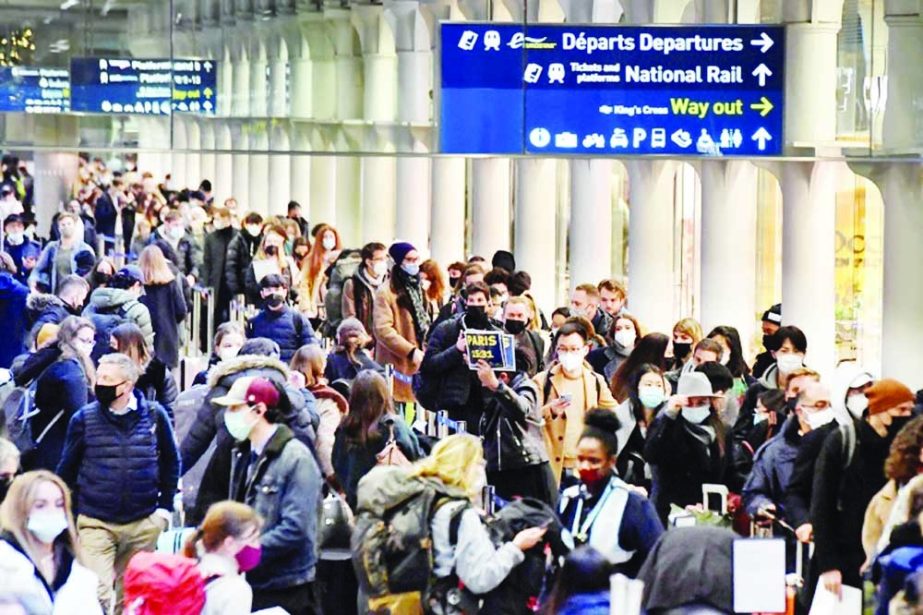
International Desk :
French authorities have urged people to get vaccinated against COVID-19 before the holiday festivities as infections surge and the government tries to avoid another lockdown.
“The fifth wave is here and it is here in full force,” Prime Minister Jean Castex told a news conference on Friday, likening the spread of the highly mutated Omicron variant in Europe to “lightning,” reports Al Jazeera and news agencies.
Castex further said the fast-spreading and highly transmissible variant is expected to dominate infections in France at the start of January.
To curb the spread of the virus during the holidays, the government banned public concerts and fireworks displays at New Year’s celebrations. It also called on people to avoid large gatherings and limit the number of family members congregating at Christmas.
“The fewer you are, the lower the risk,” Castex said.
France has also sharply restricted travel to the country from outside the European Union, including from the United Kingdom, where Omicron has been behind record numbers of coronavirus cases.
Authorities announced limits on reasons for travelling to France from Britain, a negative virus test less than 24 hours old and a mandatory 48-hour isolation upon arrival beginning on Saturday.
Al Jazeera’s Natacha Butler, reporting from Paris, said the French government has been monitoring the situation in the UK “with a lot of concern”.
“They’re seeing the high number of COVID-19 infections there and particularly the spread of the Omicron variant,” she said. “Even though there are registered cases of Omicron here in France, the government says what they need to do is try to slow down its transmission. And this is just one of the ways they’re trying to do so.”
On Saturday, French Health Minister Olivier Veran said Omicron is now suspected to be responsible for up to 10 percent of new confirmed COVID-19 cases in the country.
French authorities have also accelerated vaccinations, including a massive push to administer as many booster shoots as possible before families gather for Christmas. Health officials narrowed the gap between the second and third shot to four months from the previous five, Castex said.
The National Velodrome in Paris, the home of France’s track cycling team and now once again the country’s largest vaccination centre, was buzzing with people getting jabs before heading home – or doing last-minute shopping – for the holidays.
With a daily average of 50,704 infections over the last week and 60,866 on Thursday alone, people said they are not willing to risk their health and take chances on the safety of their loved ones.
“It’s to be safe,” said Nilo Schwencke, a doctoral student.
Before coming on Friday to get a booster, Coralie Vieville said she had shared a file with 40 family members, expected to gather for Christmas, to determine who has already been vaccinated and who has not.
“That’s how we are preparing,” Vieville said. Because it’s a large family, she said, “it’s quite important to do this and be sure there’s as little risk as possible.”
Tackling non-vaccination
More than 48 million of France’s 67 million people are fully vaccinated and tens of thousands are signing up for first shots or boosters.
“People often forget and say ‘I’m vaccinated, I’ve caught COVID, the vaccination’s not working,” said Marc Morales, a doctor at the Velodrome, as recreational cyclists sped around the track. “That’s false. It protects against severe cases, it reduces transmission but in terms of transmission it’s not 100 percent efficient.”
Castex said the government would announce new measures to tackle non-vaccination from next year.
“While we have given time, a lot of time for those French people who were hesitant and had doubts, in January we will strengthen the incentive for vaccination, because it is not acceptable that the refusal of a few million French people to be vaccinated, puts the life of an entire country at risk,” he said.
To increase pressure on people to get vaccinated, the government will present a bill early next year to change the French health pass into a vaccination pass. That means people will have to be vaccinated in order to enter restaurants or use long-distance public transport.

